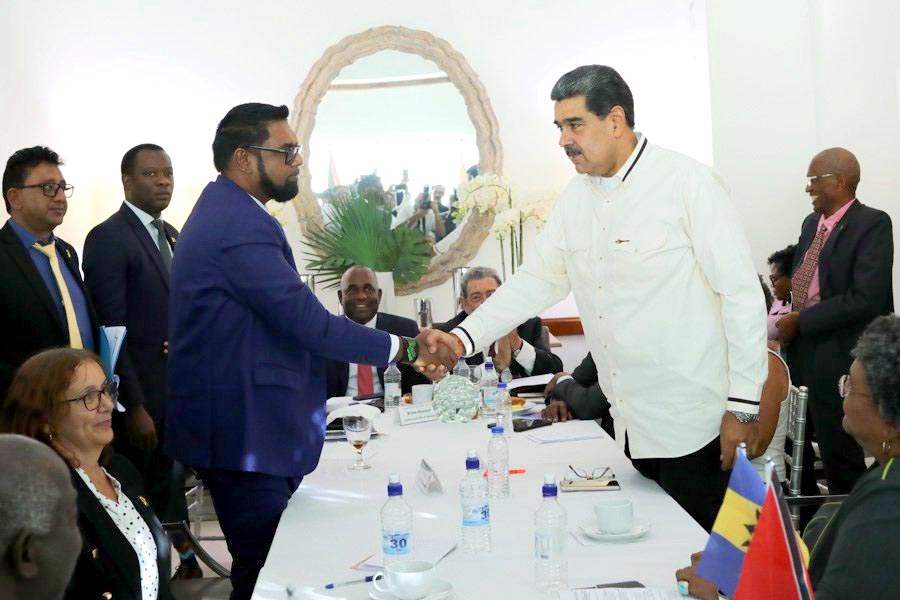
A ST. VINCENT meeting to address the Essequibo dispute took place on Thursday.
This regional meeting aimed to curb geopolitical tensions between Venezuela and Guyana.
On Thursday, the Venezuelan President Nicolas Maduro and the Guyanese President Irfaan Ali were meeting in Saint Vincent and the Grenadines to address the dispute over Guyana Esequiba, a territory of about 160,000 square kilometres rich in natural resources.
Their meeting was taking place after several weeks of tension related to the holding of a consultative referendum through which over 95 per cent of Venezuelans supported the defence of their country’s sovereignty and the creation of the state of Guayana Esequiba.
Once the results of the referendum were known, the Venezuelan government began to implement the popular mandate through measures such as the establishment of a military division near the area, the delivery of identity cards to the residents of Essequibo, and the appointment of a single authority for the area.
With the aim of curbing geopolitical tensions, Brazilian President Lula da Silva and the Community of Latin American and Caribbean States (CELAC) proposed a meeting between Maduro and Ali, which was also being attended by several leaders from the Caribbean region.
Among them were St. Vincent Prime Minister Ralph Gonsalves, Dominica Prime Minister Roosevelt Skerrit, Trinidad and Tobago Prime Minister Keith Rowley, Barbados Head of Government Mia Mottley, and the leaders of Saint Lucia, Grenada, and the Bahamas.
The meeting also brought together United Nations representatives and Lula’s personal envoy Celso Amorim, who was Minister of Foreign Affairs and Defence of Brazil.
‘We arrived in Saint Vincent and the Grenadines, with the flag of peace and the mandate of the Venezuelan people held high,’ President Maduro said upon arriving at the international airport of the host country of the meeting.
Meanwhile in Argentina, new right wing PresidentMilei’s economy package includes a sharp currency devaluation.
President Javier Milei applies a shock policy that seeks severe reductions in public investment.
On Thursday, President Milei’s administration announced that the official nominal value of the Argentine currency with respect to the US dollar goes from 400 to 800 pesos per dollar.
In a pre-recorded message, Economy Minister, Luis Caputo presented the following 10 emergency measures:
1. State labour contracts with less than one year of validity will not be renewed.
2. Government national advertising in the media will be suspended for one year.
3. The number of ministries is reduced from 18 to 9, and the number of secretariats from 106 to 54, allowing for a 50 per cent reduction in hierarchical positions in public administration and a 34 per cent reduction in political positions in the national government.
4. State transfers to provinces will be minimised.
5. The national government will not tender new public works and will cancel approved tenders whose development has not yet begun. Infrastructure projects will be undertaken by the private sector.
6. Subsidies for energy and transportation will be minimised.
7. The official exchange rate moves from 400 to 800 Argentine pesos per US dollar.
8. The current import regulation system will be replaced by a statistical system that does not require prior state approval of licenses.
9. Public assistance programmes for the unemployed will be maintained.
10. The amount of the ‘Universal Child Allowance’ will be doubled, and the amount of the ‘Food Card’ will be increased by 50 per cent.
In justifying the severe contraction of public investment and monetary devaluation, Caputo argued: ‘If we continue as we are, we are inevitably heading towards hyperinflation,’ which could reach an annual rate of 15,000 per cent.
For Milei, the current Argentine macroeconomic problem stems from a public deficit financed by monetary emission that produces inflation and must be solved ‘at its root’ through the restoration of fiscal balance.
The emergency package aims to ‘neutralise the crisis and achieve the stabilisation of economic variables,’ said Caputo, who believes the new official exchange rate will provide ‘adequate incentives for industrialists and exporters to increase production’.
With monetary reserves at critical levels, the Milei administration’s objective seems to be to encourage the inflow of foreign currency through exports.
In order to do so, Caputo also announced a temporary increase in import taxes and export duties on non-agricultural products.
However, there were no announcements about the multiple exchange restrictions that Milei promised to lift during the campaign or how the government will address the heavy liabilities of the Argentine Central Bank.
‘We will be worse off than before in terms of inflation for a few months,’ Caputo admitted, echoing promises previously made by the far-right President Milei.
In Ecuador, trade unions have condemned President Daniel Noboa’s bill seeking the privatisation of public services.
On November 23, businessman Daniel Noboa was sworn in as president of the country until 2025, a task that he described as ‘hard and difficult’.
On Wednesday, the Workers’ United Front (FUT) and the Ecuadorian Confederation of Free Union Organisations (CEOLS) criticised Noboa’s ‘Economic Efficiency and Job Generation Law’, which was discussed in the first debate in the National Assembly.
Besides demanding the immediate payment of overdue salaries to public officials, the unions rejected the creation of free trade zones that undermine labour conditions and the forgiveness of debts for large corporate groups.
CEOLS President, Marcela Arellano, denounced that the Noboa bill opens the doors to the privatisation of strategic economic activities and public services.
‘The bill is unconstitutional,’ she emphasised, stating that one of the consequences of the proposed policies would be an increase in the prices of goods and services.
Union leaders also denounced that they unsuccessfully requested a hearing in National Assembly’s Economic Development Committee.
‘The lawmakers have not shown the will to address the working people’s concerns,’ FUT President Jose Villavicencio said.
He explained that the bill will forgive tax fines, interest, and surcharges for the country’s large economic groups.
On December 19, FUT, CEOLS, and their union organisations will mobilise toward the National Assembly to demand that lawmakers do not approve the Noboa bill.